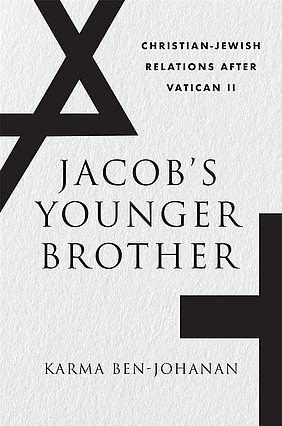Jacob’s Younger Brother by Karma Ben-Johanan is an academic analysis of Christian-Jewish relations covering the period between the Second Vatican Council’s groundbreaking 1965 document Nostra Aetate and the resignation of Pope Benedict XVI in 2013. The book offers a scholarly, theological examination of how each faith regards the other rather than a social or political history of the oft-painful relations between the two faiths. Ben-Johanan's work is framed by a historical over-view of traditional Church teachings about Judaism and Jews over the centuries, which appears in chapter 1, and her final reflections on post-Benedict develop-ments regarding the present dynamics between the Church and the Jewish people via an epilogue. In this last section she also intimates some future challenges for the relationship in a postmodern, rapidly secularizing global culture.
In part I Ben-Johanan studies past and contemporary Catholic teachings re-garding Jews and Judaism; in part II (“Christianity in Jewish Thought”) she surveys how Orthodox rabbis and scholars have understood Christianity traditionally, and, more significantly for her study, after the creation of the state of Israel and the Church’s “Copernican Revolution” in its theology about Jews and Judaism. Ben-Johanan teaches modern Christianity and Jewish-Christian relations at the Hebrew University of Jerusalem, and as an Israeli she devotes significant attention to the legal and theological views of contemporary (Orthodox) Israeli rabbis. This work is, to my knowledge, the only single study that scrutinizes both Jewish and Chris-tian communal responses to these changes, and the juxtaposition of the two analyses invites both explicit and implicit comparisons, frequently revealing stark contrasts.
In chapter 2 Ben-Johanan examines how Catholic clergy attempted to deal with the challenge of reassessing Judaism and the Jewish people between 1965 and 1985 and the implications of this reassessment for Catholic identity. She maintains that this prompted a reimagining of the Church as a continuation of Judaism, which constituted a distinct departure from the traditional teaching of the Church’s emer-gence as a rupture with Judaism. Ben-Johanan argues that this turn threatened the stability of Catholic tradition and caused inner-Catholic polarization. Ben-Johanan devotes chapter 3 to John Paul II’s pontificate from 1978-2005. While Catholic thinkers concentrated on theological matters in the first two decades after Nostra Aetate, the doctrinally conservative John Paul II de-prioritized further theological developments in light of their destabilizing effects, preferring instead to promote reconciliation through grand historical and pastoral gestures. Benedict’s papacy from 2005-2013 is the author’s focus in chapter 4. As an irrepressible theologian, Benedict engaged the theological dimensions of the new relationship, at times set-ting back the process of reconciliation. In particular, Ben-Johanan indicates how Benedict’s attempts to systematize the theological relationship was deemed harm-ful by many Christians and Jews.
Chapter 5 initiates part II, and here Ben-Johanan surveys Jewish Orthodox le-gal and theological premises regarding Christianity. In chapter 6, she analyzes contemporary rabbinic assessments of Christianity, especially noting some rabbis’ staunch opposition to the Church’s efforts toward reconciliation. Ben-Johanan con-tends that most contemporary rabbis retain hostile attitudes toward Christianity and have suppressed the more tolerant rabbinic positions that emerged with the advent of modernity in the 17th and 18th centuries.
Chapter 7 analyzes religious Zionist attitudes and pronouncements regarding Christianity, particularly those of Rabbi Abraham Kook (1865-1935) and his dis-ciples at the vanguard of religious Zionism. Ben-Johanan sees Kook’s dialectical understanding of both sacred and secular history as revitalizing the anti-Christian polemics that arose in the Middle Ages. Israeli sovereignty succeeded in freeing Jews from Christian domination, and this allowed Israeli Zionist thinkers to express their pent-up rage at the centuries-old denigration of Judaism and humiliation of Jews by the Ecclesia militans. In chapter 8 she examines the controversies within American Modern Orthodoxy regarding whether Jews should revise their histori-cally negative attitudes of Christianity as a mortal spiritual enemy and accept the Church’s invitation to dialogue. She also discusses the dialogue between the Vati-can and the Israeli Chief Rabbinate that began in 2000 at the request of John Paul II.
Ben-Johanan is at her best in exposing the underlying paradoxes, contrasts, parallels, and the seeming inevitabilities in Catholic-Jewish relations post Nostra-Aetate. Of particular note is Ben-Johanan’s observation of the dialectical relation-ship between Catholic and Jewish thinking. When the Church was politically triumphant, it highlighted Eusebius’ association of earthly success with spiritual truth, while Jews clung to what could be called Augustinian-type thinking by re-jecting any connection between political power and divine favor. Today, by contrast, when the Church has been denuded of political power and is in demo-graphic retreat, and when Jews possess sovereignty and are influential geopolitical players, Church thinking tends toward Augustinianism while Jews could be said to tend toward the Eusebian model. Jewish and Catholic theologies, it seems, can nei-ther completely reconcile nor separate from each other, no matter how hard the thinkers of each faith strive to do so.
Jacob’s Younger Brother covers a wide swath, and the scope of Ben-Johanan’s scholarship is at times breathtaking. While she tends to underplay some of the pos-itive Jewish developments toward reconciliation, the book is a must read for any scholar of Jewish-Christian relations. All serious studies of the post-Vatican II dy-namics between the Church and the Jewish people will now have to take this formidable book into account. As indicated, Ben-Johanan confined her study on the Jewish side to Orthodox responses to Vatican II. Scholars, clergy, students, and laypersons interested in the dramatic contemporary transformation of Jewish-Christian relations can hope that Ben-Johanan will soon use her impressive schol-arly talents to employ a wider lens on this age-old relationship by considering the contributions of non-Orthodox Jews to the yet unfinished redemptive process of fraternal recognition and reconciliation.


